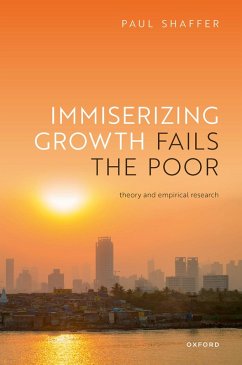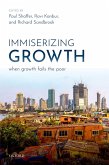Immiserizing Growth Fails the Poor refers to situations where economic growth does not lead to poverty reduction. How should this phenomenon be conceptualized? How often, when, and where does it occur? Why does it occur? Shaffer addresses these three sets of questions drawing on a wide range of theoretical perspectives and empirical approaches. This volume presents a conceptualization of immiserizing growth which combines the notions of failed and malevolent inclusion, being bypassed, and 'avoidably' harmed by growth, respectively. It develops this concept of malevolent inclusion drawing on a debate in philosophy about 'doing and allowing harm'. The analysis proceeds to examine the characteristics and causes of immiserizing growth on the basis of comparable household survey data from the 1990s using multiple poverty lines and time periods, and different measures of growth and poverty. The book also explores theories, processes, and mechanisms of immiserizing growth found in a wide variety of bodies of thought including the classical tradition of political economy (Mathus, Ricardo, and Marx), more recent radical traditions of scholarship, literatures on poverty dynamics, and inclusive growth and empirical case studies. It proceeds to empirically investigate some of the variables uncovered in this literature using cross-country econometric techniques, methods of qualitative comparative analysis and case-studies from sub-Saharan Africa, matched using cluster analysis and situated within a typological framework.
Dieser Download kann aus rechtlichen Gründen nur mit Rechnungsadresse in A, B, BG, CY, CZ, D, DK, EW, E, FIN, F, GR, HR, H, IRL, I, LT, L, LR, M, NL, PL, P, R, S, SLO, SK ausgeliefert werden.









